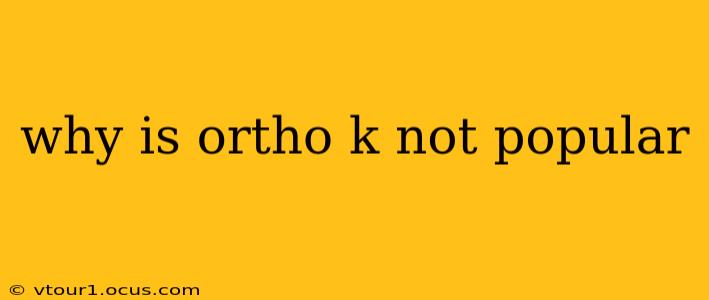Orthokeratology (Ortho-k) offers a compelling alternative to glasses and contact lenses for vision correction, yet it hasn't achieved widespread popularity. While it boasts significant advantages, several factors hinder its broader adoption. Let's delve into the reasons why Ortho-k remains a niche treatment option.
What is Ortho-k?
Before examining its lack of popularity, let's briefly define Ortho-k. It's a non-surgical vision correction method using specially designed rigid gas permeable (RGP) contact lenses worn overnight. These lenses gently reshape the cornea while you sleep, providing clear vision during the day without the need for daytime lenses.
Why Isn't Ortho-k More Widely Used?
Several factors contribute to Ortho-k's limited popularity:
1. Higher Initial Cost:
This is perhaps the most significant barrier. Ortho-k lenses are more expensive than traditional contact lenses or glasses. The initial investment, including the fitting process and the lenses themselves, can be a substantial deterrent for many people. The long-term cost may be comparable or even lower depending on the individual's needs and usage patterns, but the initial hurdle is significant.
2. Longer Fitting Process and Regular Follow-Up:
Unlike glasses or standard contact lenses, Ortho-k requires a more extensive fitting process with multiple appointments to ensure proper lens adaptation and corneal health monitoring. This can be inconvenient and time-consuming for patients. Regular follow-up appointments are also necessary to monitor corneal health and lens efficacy, adding to the overall time commitment.
3. Potential for Complications:
While generally safe, Ortho-k carries a small risk of complications, including corneal infections, discomfort, and temporary vision changes. These potential risks, although often low, can create hesitancy among potential patients who might prefer the perceived safety of glasses or traditional contacts. Proper fitting and adherence to hygiene protocols are crucial for minimizing these risks.
4. Not Suitable for All:
Ortho-k isn't suitable for everyone. Certain eye conditions or corneal irregularities may preclude its use. This limits the potential patient pool and contributes to its lower overall adoption rate.
5. Lack of Awareness:
Many people simply aren't aware of Ortho-k as a vision correction option. Limited public awareness and marketing compared to glasses and conventional contacts contribute to its niche status.
6. Insurance Coverage:
Insurance coverage for Ortho-k can vary significantly, with some plans not covering it at all. This lack of consistent insurance reimbursement adds another financial barrier for many individuals.
7. Maintenance and Care:
While Ortho-k lenses are worn only overnight, maintaining proper hygiene and care is crucial to preventing complications. This requires diligent cleaning and storage practices, which some individuals might find challenging or time-consuming.
Is Ortho-k Right for Me?
The decision of whether or not Ortho-k is right for you depends on several factors, including your overall eye health, lifestyle, and budget. Consulting with an eye care professional is essential to determine if Ortho-k is a suitable option for your specific needs and circumstances. They can assess your suitability, discuss potential benefits and risks, and answer any questions you may have. Don't hesitate to ask your optometrist or ophthalmologist about Ortho-k and explore if it could be a viable solution for your vision needs.
